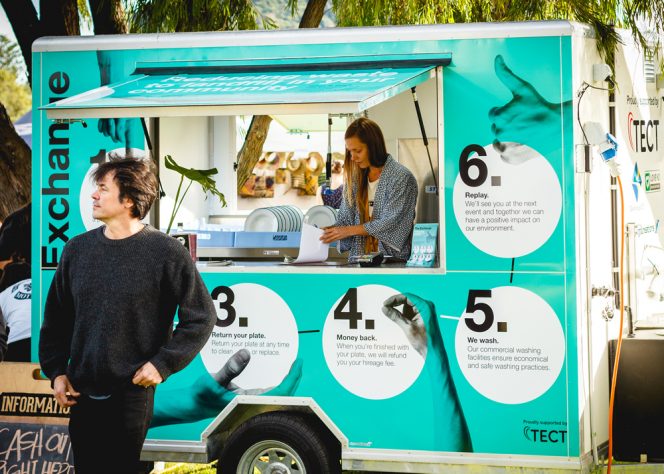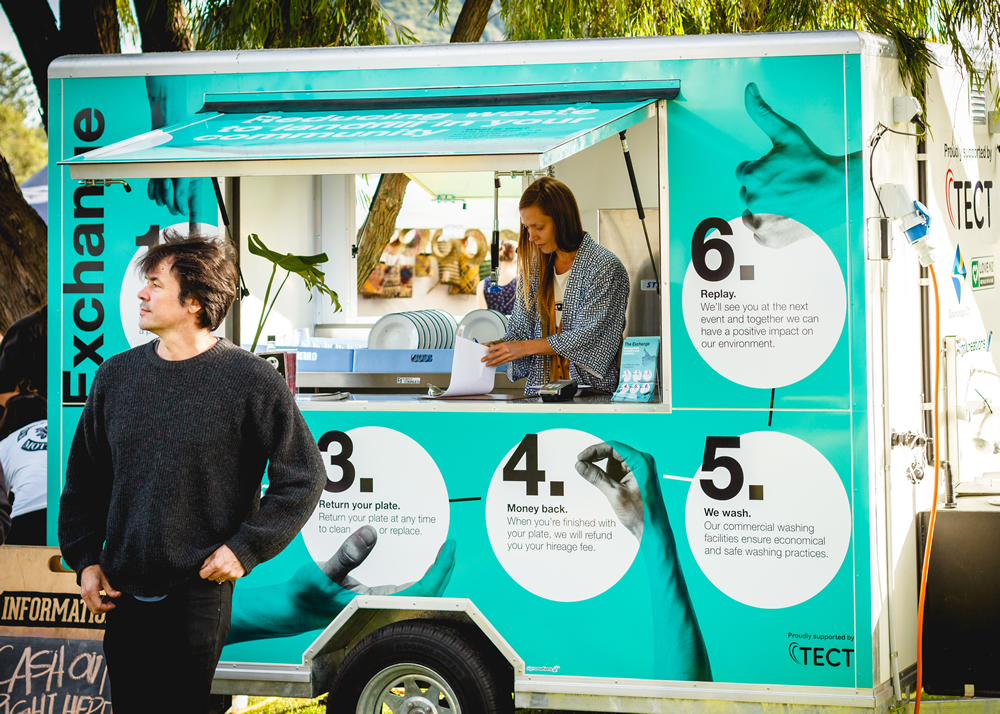BioCycle July 2017
Organics Contaminant Workgroup Issues Final Report
An article in BioCycle (March/April 2016), “Tackling Contamination In Food Scraps Stream,” discussed how a Washington State-based group of more than 70 municipal officials, composters, regulators, and representatives of various commercial businesses joined forces to devise a strategy to reduce contamination in source separated organics. The group, Organics Contamination Reduction Workgroup (OCRW), divided into four subgroups: Upstream Systems, focusing on the supply chain; Organics Processing, primarily looking at commercial composting facilities; Contractual Policies to help prevent contamination at the point of collection; and Education + Outreach to harmonize messaging on proper organics sorting procedures. The OCRW released its Final Report and Toolkit in June 2017, which includes key recommendations to reduce contamination. BioCycle will take a closer look at the recommendations and next steps in an upcoming issue.
Conference Of Mayors Adopts 100% Clean Energy Commitment
At the 85th Annual Meeting of the U.S. Conference of Mayors in late June, an Energy Resolution was adopted that supports cities establishing a community-wide target of powering their communities with 100 percent clean, renewable energy by 2035. Rationale for adopting this resolution was due in part to the Trump Administration’s withdrawal from the Paris Climate Treaty in May, as well as the administration’s dismantling of the EPA’s Clean Power Plan. “Renewable energy represents an enormous economic opportunity for our nation and our nation’s cities to create jobs in an emerging industry, increase economic security, expand prosperity for local residents, reduce air pollution and associated public health risks, reduce the strain on water resources, save consumers money, and address environmental justice challenges in communities,” states the resolution.
Sources of “renewable energy” included in the resolution are “energy derived from wind, solar, geothermal, and wave technology… Some forms of biomass may be considered ‘renewable energy’ after being evaluated for sustainability and environmental justice implications.” Specifically excluded as “renewable energy” are “energy derived from fossil fuels, nuclear, incineration of municipal and medical waste, and any large-scale future hydroelectric development.” BioCycle will explore if “some forms of biomass” includes biogas produced from anaerobic digestion of organic waste streams.
Local Control Over Landfill Proposals In Tennessee
Elizabeth Murphy, an independent environmental attorney in Nashville who has been involved in solid waste issues in Nashville for many years told BioCycle, “Unfortunately, there has been a long history in Tennessee of state solid waste regulators ignoring the wishes and concerns of local government, which is what led to the passage of Jackson’s Law in 1989. Under this resolution adopted by the Metro Council, they will have a say over any new landfill or solid waste processing facility within the Metro area and extending one mile beyond that area, and the Tennessee Dept. of Environmental Conservation cannot begin to process any permit applications until the Metro Council approves the project. More importantly for our local recycling efforts, Jackson’s Law does not apply to ‘recovered materials facilities’ so those facilities processing source separated organics and recyclables can move forward more easily.”
Nashville has recently taken steps to improve its waste diversion, which could help reduce some of its landfill needs in the future. Earlier this year, the city released a report calling for 35 percent landfill diversion by 2020 and eventually “zero waste” by 2050. Organics are seen as a key part of this plan and Nashville has teamed up with the Natural Resources Defense Council for a wide-ranging Food Waste Initiative.
Women In Waste And Recycling
Women are rising up the ranks in recycling and waste. In cities such as New York and Los Angeles, women hold key roles in the public sector. And there’s a similar trend in the private sector with women at the helm of a number of Zero Waste start-ups through out California, according to a newly formed networking group, Women in Solid Waste and Recycling (WISR). Rachel Oster of Diversion Strategies, a consulting firm in the solid waste and recycling sector, launched WISR this spring, after continuing to witness the trend of more women joining the ranks and moving up throughout the industry.
“The positive response from the industry has been overwhelming,” explains Oster after the first meeting in May, where some 50 women converged in Sacramento (CA). “I knew from talking to women throughout my career that there was a need for this, but I didn’t expect this much momentum so quickly.” WISR mission is to empower more women to take on leadership roles in the waste and recycling industry through networking and professional development. It is planning its second networking event in Los Angeles, and there are requests from women in several other cities to open chapters across the country.
“Both the men and women in our industry are excited about the prospect of a Los Angeles chapter of WISR,” explains Heather Repenning, Vice President of the Los Angeles Board of Public Works. “We are all working hard to create a more sustainable way of life in our city and it’s critical that we have women making decisions and in leadership roles in this sector.”
Vermont Transfer Stations Required To Accept Food Scraps
Act 148, the State of Vermont’s Universal Recycling Law, ultimately bans disposal of recyclables and organics by 2020. The law has been implemented in phases, starting in 2014. For example, larger food scrap generators (>104 tons/year) had to start diverting food waste on July 1, 2014 if they were located within 20 miles of a state-certified processing facility. Starting on July 1, 2017, solid waste transfer stations/drop-off facilities must accept food scraps. There are about 150 transfer stations in Vermont (both publicly and privately-owned). Most plan to have drop-off containers at the transfer stations, with arrangements made to transport the organics to composting and anaerobic digestion facilities. The transfer stations can charge a fee for food scraps drop-off.
Pizza Hut Surpasses 100 Million Pounds Of Food Donated
Pizza Hut has been donating “error” pizzas, no-show pizzas (ordered but not picked up) and breadsticks, plus surplus pizza and pasta, to hunger relief organizations nationwide since 1992. It recently surpassed a total of 100 million pounds donated. Pizza Hut’s Harvest Program was originated by the company 25 years ago in partnership with Food Donation Connection (FDC), which links individual restaurants to hunger relief organizations. FDC was founded by former Pizza Hut executive Bill Reighard, who saw a need to help the company reduce food waste. He recognized that surplus food that was safe to eat should not be discarded but rather donated to local hunger organizations. Today, FDC works with more than 17,000 restaurants and 10,000 groups across the U.S. and in other countries. Pizza Hut remains FDC’s largest donor partner.
Contaminants Review In U.K. Pas100 Revision
The United Kingdom’s compost certification standard, known as “PAS100 — Specification for composted materials,” is to be revised in the face of policy changes and questions over factors such as physical contaminants that might be found in compost. The potential for E.coli in compost is also expected to be reviewed in the revision process. The Renewable Energy Association’s (REA) Renewable Energy Assurance Limited (REAL) runs the compost certification scheme for PAS100, and will administer the process. The REA includes the Organics Recycling Group, formerly known as the Composting Association, which pioneered work on PAS100. The specification was developed in 2005 and there are now over 170 certified composting facilities in the U.K. producing 1.98 million tons/year of compost. The standard is widely recognized by farmers and growers. Compost producers are inspected at least once a year and they also have to send samples of compost for laboratory testing. REAL plans to publish the revision in March or April 2018.
Rent-A-Plate Debuts
The Exchange — a plate rental system and commercial dishwasher on wheels — recently made its debut at The Little Big Markets in Mount Maunganui in the Tauranga Bay region on New Zealand’s North Island, after three years of development. The system has market-goers renting enamel plates instead of using disposable plates and containers. Rachelle and Chris Duffy, owners of Little Big Events, got the idea for plate rentals after seeing how much waste was generated at their events. “We were a bit nervous, [as] we expected people to be like ‘that is a pain’ because sometimes people don’t like change,” Duffy told the New Zealand Herald. “But every person that came up to us said it was so cool. It was amazing.”

“The Exchange” is a plate rental system and commercial dishwasher on wheels. Photo courtesy of Scott Boardman Collective
Managed by Tauranga’s Christmas in the Park Charitable Trust, it will be used at events across the Tauranga Bay region and will be available for hire by other event organizers around New Zealand. A similar system for reusable cutlery and cups is in development. The Exchange has 1,000 plates that it rents for NZ $2 (US $1.44)/plate, refundable on return. Consumers rent the plate, buy food, and then return the plate when finished.










